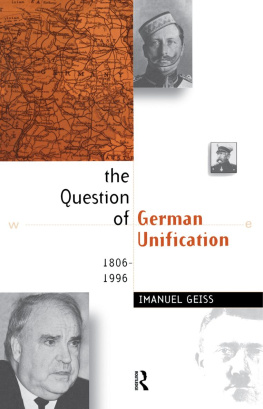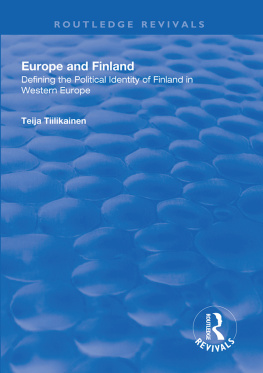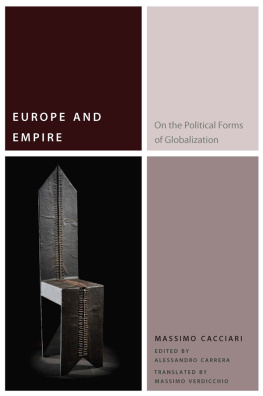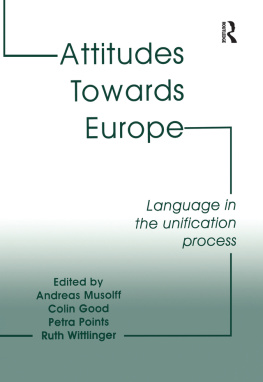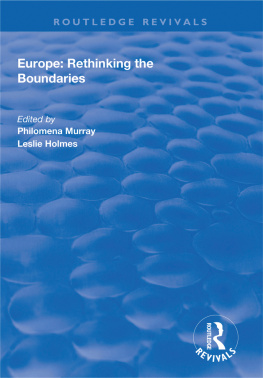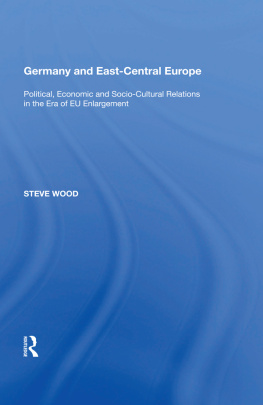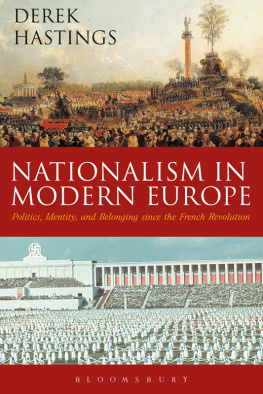GERMANY, EUROPE AND THE PERSISTENCE OF NATIONS
Germany, Europe and the Persistence of Nations
Transformation, interests and identity, 1989-1996
Stephen Wood
First published 1998 by Ashgate Publishing
Reissued 2018 by Routledge
2 Park Square, Milton Park, Abingdon, Oxon, OX14 4RN
711 Third Avenue, New York, NY 10017, USA
Routledge is an imprint of the Taylor & Francis Group, an informa business
Copyright Stephen Wood 1998
All rights reserved. No part of this book may be reprinted or reproduced or utilised in any form or by any electronic, mechanical, or other means, now known or hereafter invented, including photocopying and recording, or in any information storage or retrieval system, without permission in writing from the publishers.
Notice:
Product or corporate names may be trademarks or registered trademarks, and are used only for identification and explanation without intent to infringe.
Publishers Note
The publisher has gone to great lengths to ensure the quality of this reprint but points out that some imperfections in the original copies may be apparent.
Disclaimer
The publisher has made every effort to trace copyright holders and welcomes correspondence from those they have been unable to contact.
A Library of Congress record exists under LC control number: 98006527
ISBN 13: 978-1-138-31566-2 (hbk)
ISBN 13: 978-1-138-31571-6 (pbk)
ISBN 13: 978-0-429-45615-2 (ebk)
Many thanks to: Wayne Cristaudo, John Robbins, Bob Catley, Chris White, Silke Kantimm, Olaf Mager, May Wood, Stan Wood, German Academic Exchange Service (DAAD), Ruth Plmmer-Krger, Gert Ghs, CDU, SPD, Auswrtiges Amt, Thomas Bagger, Reinhard Meier-Walser, Dietrich Rometsch, Institut fr Europische Politik, DGAP, Eberhard Schoof, Martin Bond, Cathy Wood, Sren Kierkegaard, Pernille Tvermoes, Siegmar Schmidt, Greg O'Leary, Kristian Gerner, Nick Siegler, Hanns Maull, Knut Kirste, Simon Bulmer, Centrum fr angewandte Politikforschung, Ilona Ehlert, Paul Corcoran, Ulla Holm, Peter Mayer, Helen Wood, Muckl Kantimm, Lee Kersten, Dagmar Thiel, Pat Barkass, Joan King, Eva Bohn, Sandra and Dennis, Taketsugu Tsurutani, Thomas and Kiki, The Guvnor, Chi-Ni William Wang, Paul Arnold, Terry McCann. And probably others....
Let us make no mistake: in everyone's mind at this moment, circumstances have set up a kind of competition between the various political systems of the world. In all countries the difficulties are enormous and, in fact, similar. The links and connections between countries in the modern world are such that this could not be otherwise. Money troubles know no frontiers. The worries of a finance minister must be very much alike from one capital to another. Every nation tries to solve its problems, some by political innovation, others by trying to preserve their institutions. But nations watch each other....they draw comparisons....they compare systems and the fruits of those systems. There is indeed, as I have just told you, a competition between political mechanisms. It has to be determined which of them is best suited, in the present state of the world, to function most economically and with most benefit to the life of a people.
In the course of European history, the period between 1989's impetus towards German reunification and the 1996 re-negotiation of the 'bargain' struck at Maastricht is short. Yet during these years Europe experienced immense transformations. Some are far from completed. Adjusting to the end of bipolarity and the retreat of the superpowers, deepening integration in the West and expanding to incorporate the East, response to new security threats and globalizing economic trends are among the major challenges facing a continent purportedly moving to 'ever closer union'. As the geographic, strategic and economic-industrial core of the new Europe, the new Federal Republic of Germany (FRG) must simultaneously contend with the financial costs and social adjustment of the eastern Lnder's accession and rehabilitation extending into the next millenium. In the coming years whichever of Germany's presently conceivable political alliances is in government, it faces two vast integrative tasks: an economic and social coalescence of the formerly separate German states, over which the Federal Republic has control, that is, national prerogative; and the political unity of Europe, laid out in the Basic Lawmore so than Helmut Kohl. Germany has been affirmed as the nexus of a post-Cold War security structure in the northern hemisphere. From US perspectives greater expectations for 'responsibility' were placed with Germany as its foreign policy formulation and conduct took on new dimensions. Against the backdrop of a volatile political climate in Russia these 'partners in leadership' are the avant garde of NATO's proposed expansion.
While the 'federalist' or 'core Europe' views expressed by the CDU (Christian Democratic Union, the major government coalition party) parliamentary leader Wolfgang Schauble, Kohl and others were not entirely novel, they manifested a new determination and confidence to pilot Europe towards what is variously interpreted as a tighter merger, a transference, or a ceding of state sovereignty. These strategists averred that a core group of committed states was imperative to prevent the EU unravelling and should not be hindered by 'the slowest ship'. Having incited widespread protests the call for a core was temporarily subdued. A conception of Britain as Europe's most recalcitrant member exasperated many continental politicans, especially from Germany, but it also served to camouflage a more critical divergence. An enduring rationale decreed that 'success' hinged on Franceon the will of its political leadership, the overcoming of forces antipathetic to 'Europe', the capacity of its economy and adequate coherence of its society. A congenial France would provide emphatic impetus for the CDU agenda. But France was a task itself.
The old Adenauer Bundesrepublik of 'no experiments' is transformed and immersed in two, if not three, giant experiments While often in alignment or able to compromise there are also fissions between Germany and its partners. When this occurs domestic forces will direct Germany's weight in the service of what are perceived to be German interests with increased vigour. The 'nation', like others around it, persists and is differentiated politically from 'Europe'.
Paul Valry The Question of Universal Suffrage (1934) in Paul Valry Collected Works v7 History and Politics (London: Routledge & Kegan Paul 1962) trans. Denise Folliot & Jackson Matthews p303 Emphasis in original
Ulrich K. Preuss termed this an 'innovative and, at that time, unique commitment to participation in the creation of supranational institutions and the transfer of sovereign powers to them (article 24)' See "German Unification: Political and Constitutional Aspects" in United Germany and the New Europe Ed. Heinz D. Kurz (Aldershot:
Edward Elgar 1993) pp47-58
Experiment Vereinigung: ein sozialer Grossversuch Eds. Bernd Giesen & Claus Leggewie (Berlin: Rotbuch 1991)
American sources were prominent, later joined by German scholars. See Germany in a New Era Ed. Gary L. Geipel (Indianapolis: Hudson Institute 1993); Germany's New Position in Europe Ed. Arnulf Baring (Oxford: Berg 1994)


